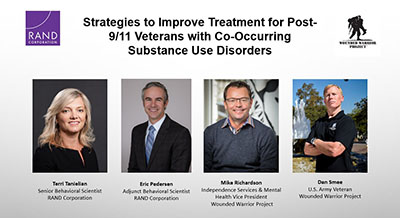Wounded Warrior Project Teams with RAND to Discuss Substance Use
WASHINGTON (Sept. 9, 2020) — Wounded Warrior Project® (WWP) hosted a panel discussion on substance use disorders (SUDs) among veterans with researchers from the RAND Corporation. The panel discussed the implications from a study released last month, highlighting the scale and likely causes of SUD among the veteran population. The data showed 11-20% of warriors live with PTSD, 13-15% have depression, and up to 24% have a substance use disorder. In addition, 34-88% of veterans diagnosed with PTSD also have a substance use disorder.
Terri Tanielian, RAND senior behavioral scientist, moderated the panel. She was joined by Eric Pedersen, RAND adjunct behavioral scientist and associate professor of psychiatry and behavioral sciences, Keck School of Medicine, University of Southern California; Mike Richardson, WWP independence services and mental health vice president; and WWP warrior and U.S. Army veteran Dan Smee.
“The takeaway [from the survey] is that mental health symptoms and substance use disorders are connected,” Pedersen said. “The research shows that people can use substances to manage their symptoms, but this causes problems down the line. And this reliance on substances to numb the pain can cause veterans to not seek deeper and longer-lasting health solutions.”
“When I deployed home, I didn’t have that support network that active duty members had,” Smee said. “I had family and friends, but it wasn’t quite enough. The stuff that happened in Iraq began to haunt me: friends I lost, friends who were severely injured, and the near misses I experienced myself. I had bad flashbacks, couldn’t sleep, and had an undiagnosed brain injury from a bomb blast. I began to self-medicate with alcohol and Ambien to help me with the sleepless nights. Needless to say, this didn’t work, and I fell into a vicious cycle.”
Smee eventually connected with WWP, which provided him and his family with critically needed support and helped him in his recovery.
“Everything we do at Wounded Warrior Project is geared toward helping warriors and their families thrive and succeed in life,” Richardson said. “But we’re always looking to improve this. And as Dan shared in his story, and as we’ve seen in our Annual Warrior Surveys, and as warriors have shared with our staff at program events or Warrior Care Network® outpatient programs, we know that unhealthy substance use is prevalent in our warrior population, and it’s a significant barrier to care.”
According to Richardson, much of the SUD treatment offered in the past has been reactive instead of proactive.
“We partnered with RAND to see what trends are emerging or what the real data says about what solutions could be,” Richardson said. “The same treatments don’t work for everyone, and integrated treatment approaches are one of the best ways we can address these challenges. We see these innovative approaches taking place at the four academic medical centers we partner with at Warrior Care Network.”
Recommendations discussed during the panel include:
- Screen for co-occurring disorders and offer treatment programs for veterans.
- Offer evidence-based integrated treatments that target SUD and co-occurring mental health disorders.
- Regularly evaluate substance use and mental health outcomes throughout treatment to ensure both needs are being addressed.
- Incorporate and accommodate veterans’ treatment preferences.
- Provide patients with a clear aftercare plan to prevent relapse.
- Consider policies to expand capacity at VA medical centers and VA-affiliated facilities.
- Implement policies to decrease barriers to accessing care, and provide incentives for treatment facilities to offer evidence-based treatments.
- Support research on the effectiveness of telehealth programs to reduce barriers to care for veterans with co-occurring disorders.
- Increase early prevention efforts to help veterans avoid developing chronic mental health or substance problems.
To read the full RAND report and the complete list of challenges and recommendations, click here.
Contact: Mattison Brooks — Communications Specialist, Government & Community Relations mbrooks@woundedwarriorproject.org, 202.969.1120
About Wounded Warrior Project
Since 2003, Wounded Warrior Project® (WWP) has been meeting the growing needs of warriors, their families, and caregivers – helping them achieve their highest ambition. Learn more.
